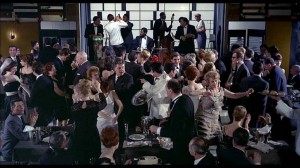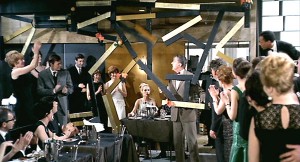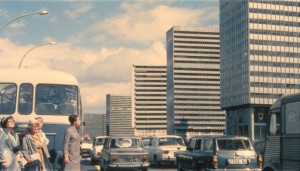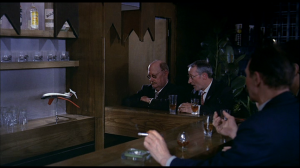Written for the special 50th anniversary issue of the Finnish film magazine Filmihullu, published in November 2018. “The ‘rules of the game’ are simple,” wrote the editor-in-chief, Lauri Timonen. “Seize the day and choose your all time favorite film scene – just one scene, from any film ever made – and write a maximum of 2000 letters (i.e. one page / A4) about it and why that moment in time is so special to you.” — J.R.
The restaurant scene in PlayTime
Jonathan Rosenbaum
My scheme for cheating a little on your assignment is to select what I shall call “the restaurant scene” in Jacques Tati’s PlayTime — a scene or sequence, in short, that actually comprises almost half of the entire film, or at the very least more than a third of the running time. It’s not even certain when this sequence actually begins — does it start with various street pedestrians watching the last-minute construction of the establishment, or does it begin more properly with the restaurant’s official opening? — but I will assume that it ends with one of the few antirealistic gags in the film, the early-morning crowing of a distant rooster, as various restaurant customers stagger out into the street.
I have previously described this scene overall as the most accomplished example of mise en scène in film history, perhaps because it has the greatest number of interactive working parts, and of course one of the most active and creative working parts in this ensemble is the dancing gaze of the observing spectator, which is at once part of Tati’s mise en scène and a mise en scène that works somewhat independently of his own — that is to say, a collaboration that functions somewhat differently with each successive viewing of the film. I’ve often said that PlayTime is a film that teaches me how to live in cities, and one way it does this is by inviting me to cope creatively and spontaneously with sensory overload by redistributing its various elements in relation to my attention.
This means, in effect, that we become observers of and participants in a developing community and mutual form of celebration at the same time -– which is another way of saying that we become both drunk and sober, inert and hyperactive, lonely and engaged.




